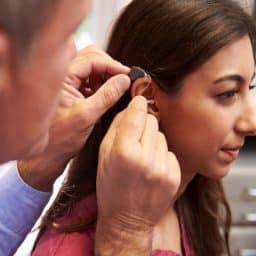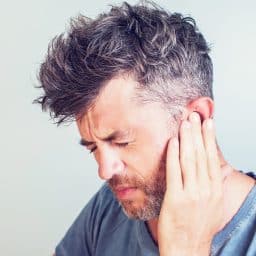Can I Reverse My Hearing Loss?

One of the most common questions people have about hearing loss is whether or not it is reversible. While many cases of hearing loss are permanent, others are temporary and can resolve on their own or be reversed with the proper treatment. Temporary Hearing Loss Cases of temporary hearing loss are often due to a…
Is It Your Hearing, or Is It Your TV?
You’re watching the latest episode of your favorite TV show, wrapped up in the story and hanging on each actor’s every word. Suddenly, you can’t make out a sentence, blurt out, “What did she say?” and completely lose the plot. Struggling to hear your TV is a telltale sign of hearing loss. Unfortunately, modern TVs,…
Stanford Teams Collaborate to Solve High-Frequency Hearing Loss
Every hearing profile is unique, and each hearing impairment requires an equally unique solution. Be that as it may, in general, hearing solutions usually fall into two major categories—traditional hearing devices or cochlear implants, both of which are excellent options and help millions of people. However, some people fall into a hearing loss niche proving…
Tips to Lower Your Risk of Hearing Loss

Hearing loss causes are generally categorized as congenital or acquired. Congenital hearing loss is caused by factors present at birth, such as genetics, maternal diabetes and more. Because these causes are present at birth, they cannot be changed. Acquired causes are a little different. Acquired causes are those acquired after birth during any time in…
How Does Cardiovascular Health Contribute To Hearing Loss?

Good cardiovascular health greatly improves your quality of life and may even help prevent hearing loss. Let’s take a look at the effect poor cardiovascular health may have on hearing loss, as well as how you can prevent it. The Effect of Cardiovascular Disease on Hearing Loss A study on the influence of cardiovascular health…
The Relationship Between Fear and Hearing Loss

According to the National Institute on Deafness and Other Communication Disorders, “Approximately 15% of American adults (37.5 million) aged 18 and over report some trouble hearing.” This means hearing loss is an extremely common condition. That being said, it doesn’t mean being faced with the diagnosis isn’t at least a little bit scary. There are…
What Common Noises in The Ear Mean

Have you ever been startled by a random noise in your ear? Whether it’s a ringing, crackling, popping or other noise, let’s look at a few causes of noises in the ear as well as potential treatment options. Ringing or Buzzing Ringing in the ears is typically associated with tinnitus. However, some people experience hissing,…
How to Tell if Your Loved One Has Hearing Loss

According to an article published in the National Library of Medicine, “In adults, the prevalence [of hearing loss] appears to be nearly two-thirds of adults over 70 years of age in the United States, though it may be much higher.” If you have an older loved one who seems to experience hearing loss, it’s important…
How Your Home’s Acoustics Can Affect Your Hearing

According to the National Institute on Deafness and Other Communication Disorders, “Approximately 15% of American adults (37.5 million) aged 18 and over report some trouble hearing.” If you’re among this population, you may have noticed that the acoustics in your home can affect how well you can hear people talking to you. Below we review…
How To Make the Most of Dating With Hearing Loss

Dating always has the potential to be a little nerve-wracking! If you have hearing loss, you may be worried about how it might impact your dating life or how to talk about it with any new potential partners. Let’s go over a few ways to make the most of dating when you have hearing loss….
